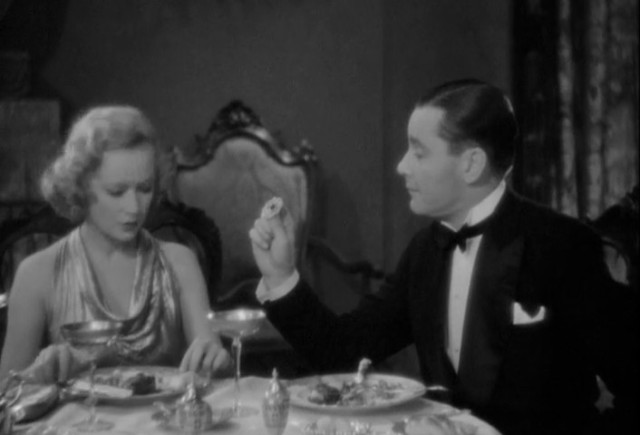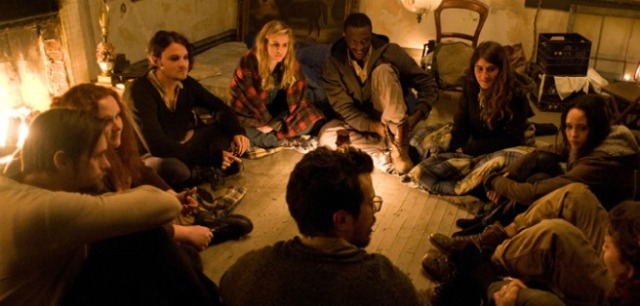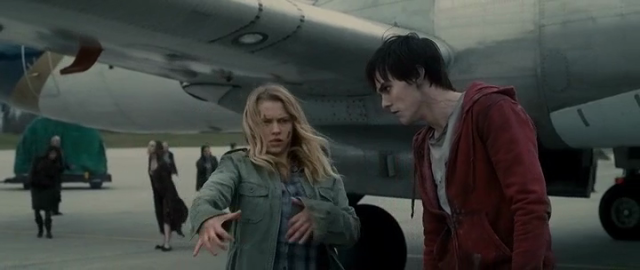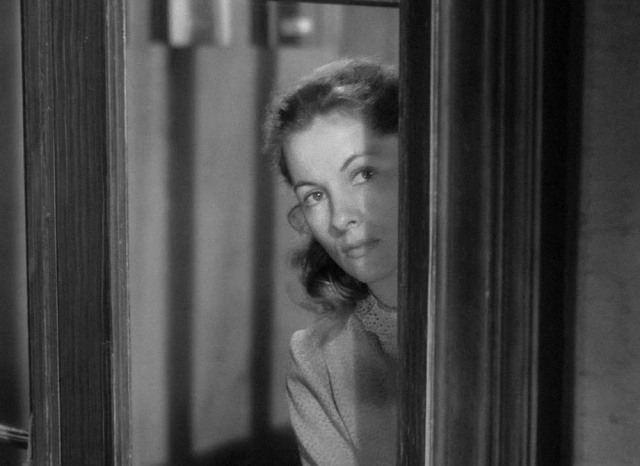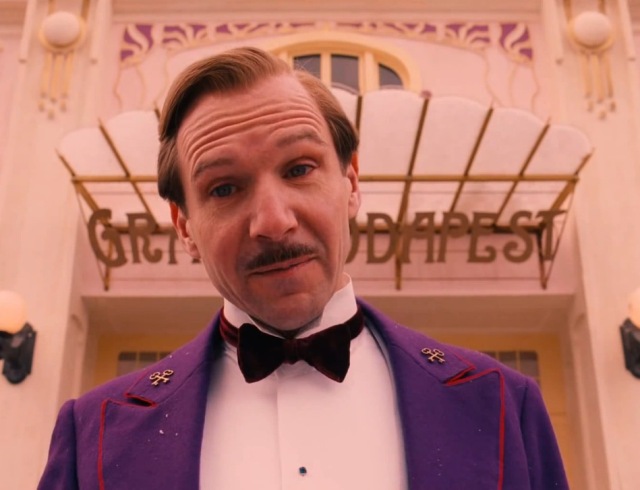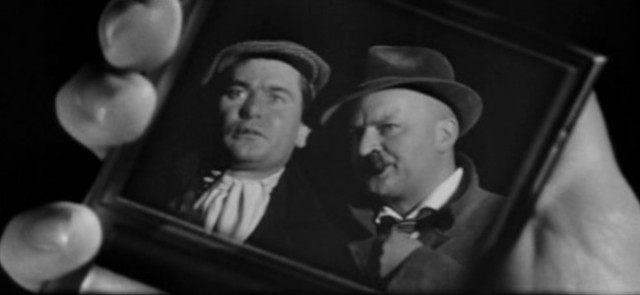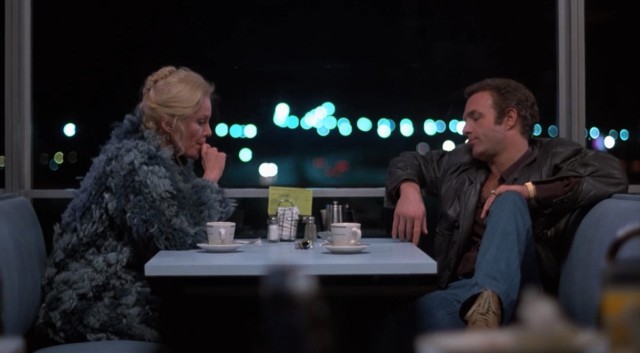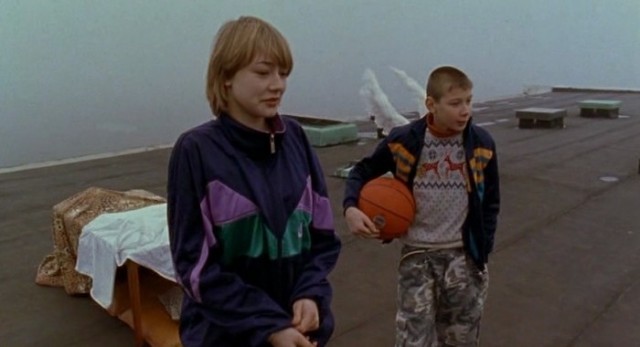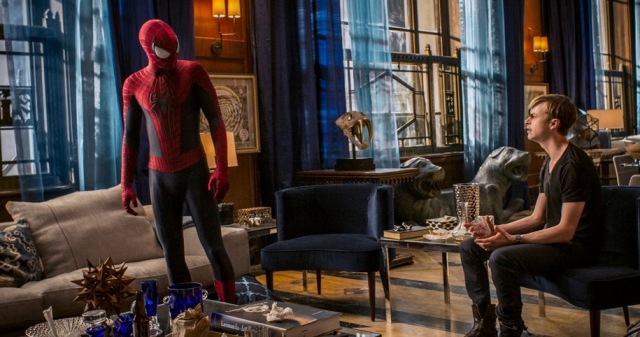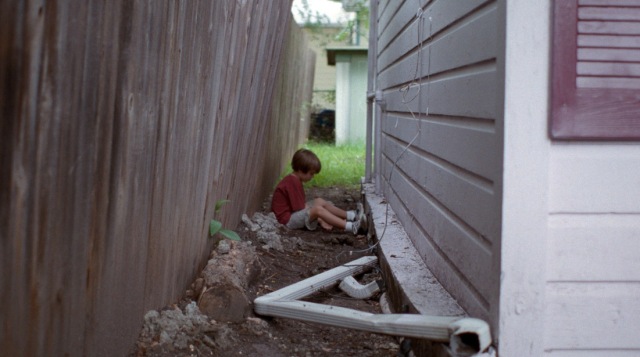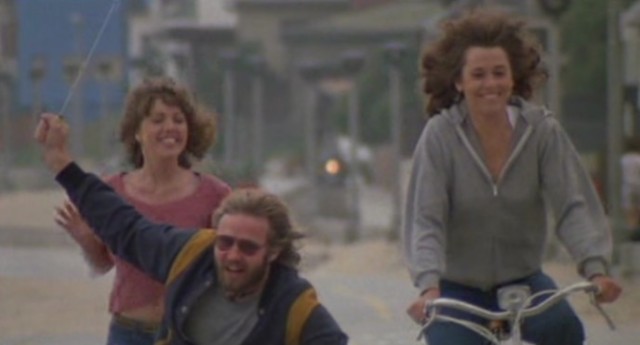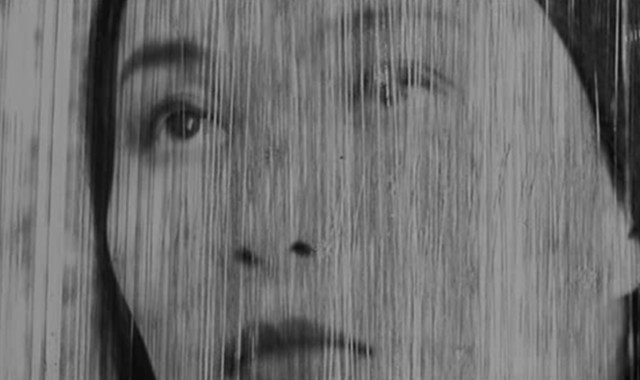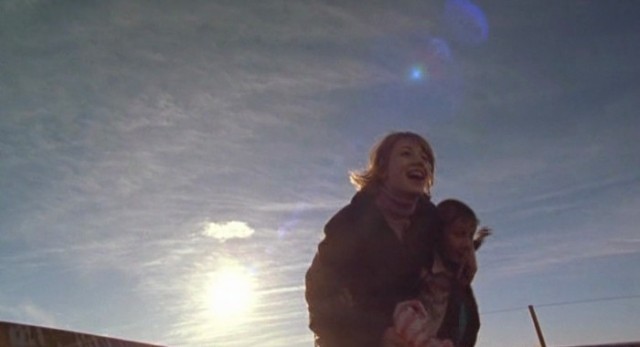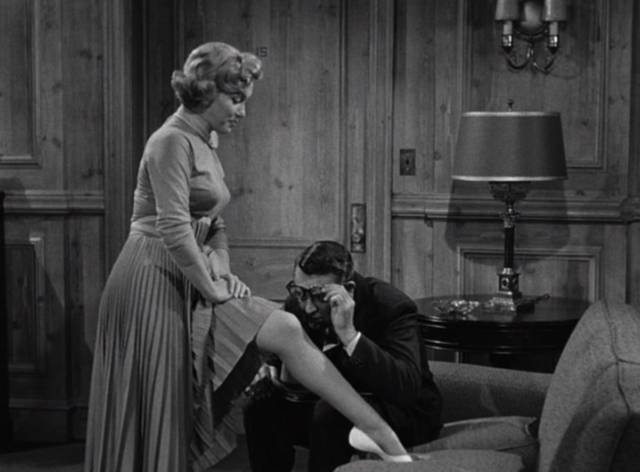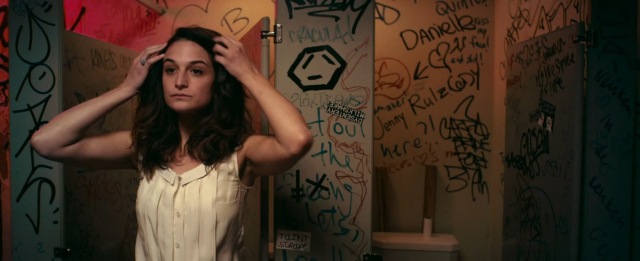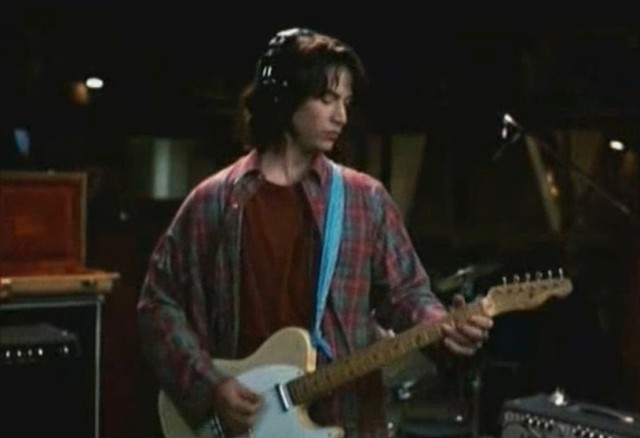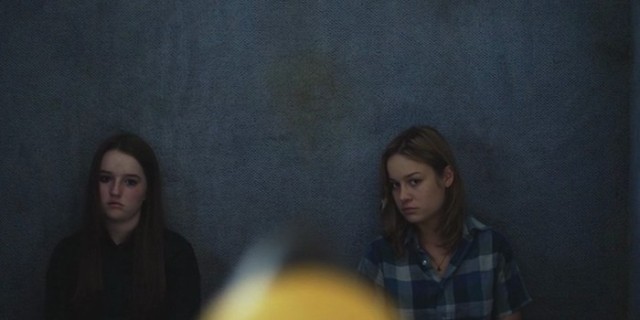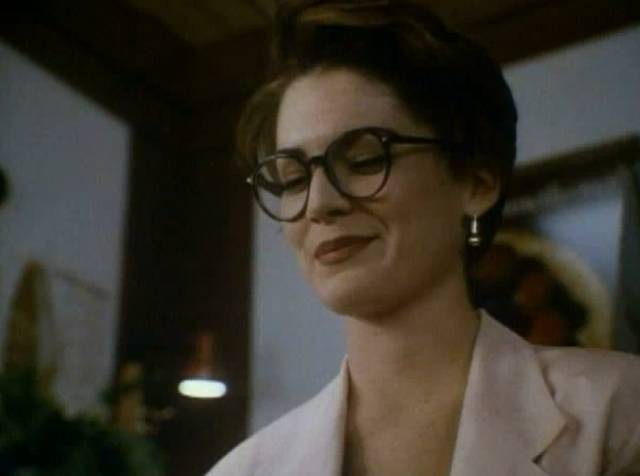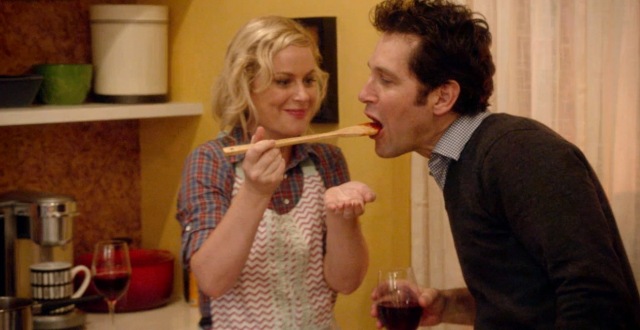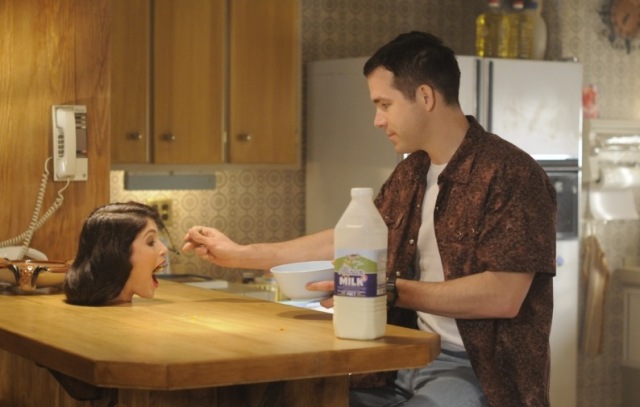Films reviewed: “Aatsinki: the Story of Arctic Cowboys”, “The Armstrong Lie”, “At Berkeley”, “Electro Shaabi”, “How We Used to Live”, “Leave to Remain”, “Mistaken for Strangers”, “My Fathers, My Mother and Me”, “Night Moves” (pictured above), “Teenage” and “We Are the Best!”.
This year’s London Film Festival was split into strands including Cult, Dare, First Feature, Galas, Journey, Laugh, Love, Official Competition and Thrill. Most of these reviews were originally written for The Digital Fix and cover the Debate, Documentary and Sonic strands.
If these things interest you, How We Used to Leave and Leave to Remain were world premieres. I also enjoyed The Armstrong Lie enough to seek out its director, Alex Gibney, for an interview – the audio needs to be transcribed, but look out for that in the near future. And Lance, if you’re reading, I’ll interview you too; just drop me a message on Twitter at @halfacanyon.
Aatisinki: The Story of Arctic Cowboys – 3/10
Director/Writer: Jessica Oreck
UK/US release date: Unannounced, but last minute flights are available
Strand: Documentary
Oreck’s minimalist approach to filming is admirable, but I suspect viewers will change their mind after about 15 minutes. She captures the beauty of Finland’s landscape and its reindeer population, while unflinchingly leaving in the grisly parts – these animals are cut up for food. She also doesn’t add anything. Really, it’s a succession of establishing shots.

The Armstrong Lie – 7.5/10
Director: Alex Gibney
Writer: Peter Ackland
Starring: Lance Armstrong
UK release date: TBC
US release date: 8th November 2013
Strand: Documentary
“I’ve had such a big history with that fucking mountain.”
Firstly, it’s worth noting I’m not a cycling aficionado; in a similar admission that introduced my Rush review, I never even learned to ride a bike. Secondly, my knowledge of the Lance Armstrong doping incident is fairly middling – perhaps a bit more than average as I watched the first 20 minutes of his Oprah interview.
My prior knowledge is relevant as much of what I found gripping in The Armstrong Lie will have already been eaten up by the sport’s staunchest fans. Armstrong’s conspiracy and long-awaited comeuppance is still fascinating, both in sporting terms and sheer psychological complexity – but even I was familiar with large chunks of the material. Similarly, I’m not sure how viewers will share my amusement at the complex racing tactics surrounding the Tour de France.
However, that’s not to say Armstrong experts won’t find anything new in The Armstrong Lie. Part of its strength is the sheer wealth of material, much of which is personal to director Alex Gibney, as opposed to just scouring archives. The multi-angle approach is also refreshing, with agendas quashed by the vast number of interviews and supporting footage. In short, this isn’t a one-on-one interview with Oprah, but a far wider portrait.
Gibney already completed a documentary about Armstrong’s 2009 comeback, which praised the cancer survivor’s fairytale return to the Tour de France podium – once again without the use of drugs, said Armstrong at the time. Unsurprisingly, the revelation threw a spanner into the documentary’s wheels, with The Armstrong Lie emerging as a product from a director who felt cheated. In fact, Armstrong is coerced into delivering exclusive interviews that Gibney feels are personally “owed”.
The doping scandal is fascinating in itself, as a closeted criminal circle that involved a surprisingly large number of sports associates in on the secret. Past footage features some interviewees all but revealing the inner workings, particularly Armstrong’s trainer, Michele Ferrari, whose scientific arrogance mimics a mad scientist battling against human limitations.
I could go further by describing the frequent denials, blackmail incidents and failed lawsuits, all of which make Armstrong seems like a psychopath with retrospective knowledge. However, that would turn this review into an overview of the case. Gibney’s take is smart and riveting through deft editing, rarely lingering on a point for too long because another close subject has a counterargument.
Ultimately, The Armstrong Lie isn’t about doping, but about power. I’m sure at least 70% of reviews will mention that line, seeing as it’s clearly enunciated in the film and was followed by other critics scribbling in their notepads. At one point, the cyclist informs a coach, “You’re not my dad.” However, that’s the crux of Gibney’s documentary, with drugs simply being the MacGuffin – and The Armstrong Lie is an admiral attempt to escape Armstrong’s alluring fairytale appeal.

At Berkeley – 7/10
Director: Frederick Wiseman
Any release date: TBC
Strand: Documentary
“Have faith in rational argumentation and the marshalling of evidence, as opposed to mere cheerleading.”
There’s no reason for At Berkeley to be 244 minutes long. Maybe it’s because the documentary covers the protests over Berkeley University’s budget cuts – cutting coverage is an extension of capitalism? Well, I won’t go 5-star crazy, like other reviews. Sure, Wiseman is very detailed and encompassing about the subject matter, but how could you not be with a 244-minute running time?
There’s an episode of The Sopranos where Tony informs his daughter that he’d be furious if she studied at Berkeley, which says half as much as the film in a single sentence. In the third hour, someone complains faculty meetings are too long – but doesn’t turn to wink at the camera.

Electro Shaabi – 2.5/10
Director: Hind Meddeb
Starring: MC Sadat
Any release date: Unlikely
Strand: Sonic
“Do you want to make me suffer?”
I don’t see many music documentaries I dislike. For better or worse, I find much of the appeal in the music itself. I thought Shane Meadows wasted his material on The Stone Roses, yet, through its many faults, I enjoyed Made of Stone purely for the high quality live footage.
Electro Shaabi is another matter. The eponymous genre, an Egyptian pop culture phenomenon, can be described as clapping along to a keyboard preset while shouting bad poetry on top. Of course, the music itself is irrelevant. Director Hind Meddeb is really aiming to pinpoint the movement’s role in free speech; an outlet for the dissatisfied youth to express their political anger without fear of retribution.
However, the lyrics rarely touch the subject (and never with any depth). Largely, the amateur rappers, who are all male, sing about life in abstract terms – apart from the subject of girls, where they get weirdly specific. They claim their words have meaning, but I couldn’t find any, and neither does the documentary. The rough footage doesn’t help, especially with subtitles littered with spelling errors that rather annoyingly end with full stops on every line.
There are extremely brief moments of intrigue, all of which have nothing to do with the music. One musician speaks of the frustration with the night scene, whether men and women party separately on the dance floor; after one comment, it’s never mentioned again. In ten years time, all I’ll remember about the film is how horrified I was that the main rapper feeds cold cut meat to his pet chicken.
At one point, a subtitling error brings up an unspoken lyric: “Give me something new/ I am fed up.” It’s rather apt.

How We Used to Live – 7/10
Director: Paul Kelly
Starring: London, Saint Etienne, Ian McShane
Any release date: TBC
Strand: Sonic
It seems fitting that this year’s London Film Festival hosted the world premiere of How We Used to Live: a gorgeous ode to the city’s past. The film is a collaboration between director Paul Kelly and indie band Saint Etienne, with a poetic mix of subtle pop music and old footage sourced from the BFI’s National Archive.
Central London is presented as an innocent stranger in images and short clips dating from the 1950s to the 1980s; the landmarks are recognisable, although the optimism is harder to find. A sparse voiceover by Ian McShane adds small subtext (including an amusing line about ignoring strangers on the Northern Line) but knows when not to intrude – the succession of nostalgia and harmonies is enough.
At no point did I feel the voices of Kelly or Saint Etienne overwhelming the subject matter of How We Used to Live. Rather than call it minimalist, I think selfless is a more accurate adjective of their approach. I’ve lived in London all my life and, due to age, was unable to recognise much of the city apart from the shapes of roads I frequently walk on.
It’s possible to write a lengthy essay about what the film is saying, although I sense that would be one’s unfair appropriation of the ego – for 70 minutes, the “truth” behind the archive footage allows the viewer to find their own interpretation. After all, Thatcher’s influence lurks like an unwelcome presence because of chronological progression, but there’s a strong city spirit underneath that survived the war and industrialisation.
The filmmakers previously worked on a trilogy of London tributes (Finisterre, What Have You Done Today Mervyn Day and This is Tomorrow), and their experience is evident in the documentary’s natural flow. The structure of How We Used to Live sounds easier in practice, but is a technical skill in execution – one of pristine timing and artistry.

Leave to Remain – 5/10
Director/Writer: Bruce Goodison
Starring: Noof Ousellam, Masieh Zarrien, Yasmin Mwanza, Toby Jones
Any release date: TBC
Strand: Debate
“He’s family.”
Goodison’s accomplished drama tackles the hot topic of asylum seekers: an ensemble of young teenagers reside in London, parentless, escaping their home country’s dangerous circumstances. Toby Jones is sympathetic and welcoming – which can’t quite be said about the law.
The drama’s subject matter is important and is based upon years of research. However, those pre-interviews are probably more effective that these fictionalised accounts. Snow falls in the final scene, which somewhat undermines the final act’s revelations.

Mistaken for Strangers – 7/10
Director: Tom Berninger
Starring: The National
Any release date: TBC
Strand: Sonic
“I feel like I’m on the outside looking in.”
I used to think The National were for anyone too embarrassed to admit they like Bruce Springsteen, or frightened of Interpol’s danceability. Mistaken for Strangers doesn’t change my opinion, but it also isn’t really about The National.
The charmingly low-key film largely documents the indie band’s recent tour, without requiring any knowledge or passion for the music. In fact, it might even help. The director, Tom Berninger, is the younger brother of Matt, the lead singer; Matt invites Tom to be a roadie, in a act halfway between nepotism and pity. Instead of gratitude, Tom offers little indication he cares about The National’s style – he’s a self-proclaimed metal head frustrated that too many of the band are “coffee house”.
Tom isn’t constructing a slur piece, even if The National often come across as humourless dullards who take themselves too seriously (which, come on, is obvious from the music). Instead, he focuses on his sibling rivalry with Matt: there’s little about life in a rock band, but more on what it’s like to live in your famous brother’s shadow. The pair barely seem related; Tom’s an unsuccessful Jack Black doppelganger, while Matt’s handsome figure emerges from hotel rooms in a dapper suit and sunglasses.
Tom’s goofiness is integral to Mistaken for Strangers maintaining its unlikely heart, as he plays the underdog card – the band and crew tolerate interview questions like “Where do you see The National in 50 years? 40?” Not only does he look like Jack Back, but he shares a “lovable jerk” persona. When Tom shouts, “Hey Moby!” in a swimming pool, it could easily be from The School of Rock.
Mistaken for Strangers is extremely funny, mainly from throwing misfit Tom on tour with such a miserable band – they’re self-serious and lacking sentimentality, the opposite of Tom. When he’s sent back home to Cincinnati, the film falters with a lack of authenticity; there’s much rewriting of one’s story, as expected, and neatly tied loose ends. But for the actual tour, there’s a touching story of sibling jealousy: standing on the outside looking in as your brother is loved every night by adorning fans (including Werner Herzog), while you’re occupied with a Toblerone.
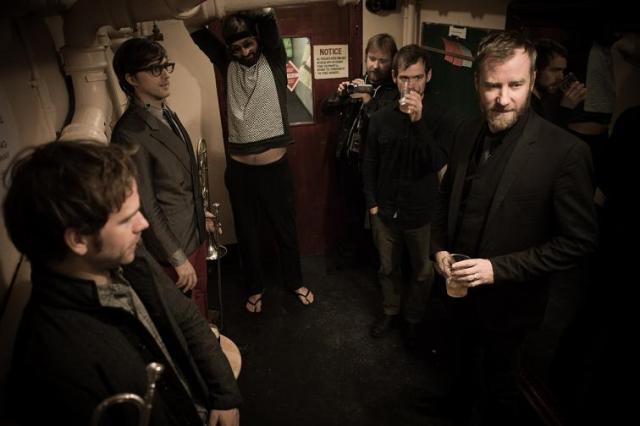
My Fathers, My Mother and Me – 6.5/10
Original title: Meine Keine Familie
Director/Writer: Paul-Julien Robert
Starring: Paul-Julien Robert, Otto Muehl
UK/US release date: TBC
Strand: Documentary
“He who walks well, feels well.”
Friedrichshof, an Austrian sex commune, ran for 20 years until its dissolution in 1991. The group believed in free love and strived for an alternative to the nuclear family model – children didn’t know the identity of their father, other than he’s in the same room. (Mothers were chosen through a strict selection process – “they can’t be depressed or sexually damaged.”)
The documentary’s director, Paul-Julien Robert, was one of those children. In My Fathers, My Mother and Me, Robert looks back on the commune and explores how it affected his life. The answer: quite a bit. His quest is ostensibly to find his biological father, while on the way he interrogates his guilt-ridden mother – she sobs, without providing an explanation for her past actions.
Robert largely revisits his childhood through archive footage (the commune’s leader wanted to document their activities so others could follow example) which is fascinatingly, horrifyingly bizarre: the commune’s main goal is provide everyone’s existential and material needs, yet appears to be a number of horny, brainwashed adults. One past resident admits the experience was an extension of puberty.
However, there’s a scarier side, particularly when children are involved. Not only are they hidden from the outside world, but are introduced at an early age to humiliating performance art rituals (and far, far worse activities). The dark premise is even murkier when the anti-materialism philosophy is corrupted by financial greed and indoctrination that wouldn’t be out of place in The Master. The group’s founder, Otto Muehl, was later arrested for paedophilia.
I feel cruel to point out that Robert’s new material is vastly overshadowed by the commune’s footage. That’s to be expected, given the extraordinary activities that took place – choreographed sex acts; a child, too distraught to play the harmonica, is punished with a bottle of water. However, Robert provides little context through interviews that aren’t already in the old videos. In the present day footage, even if his mother’s tears are real, she seems awkward self-aware of the camera.
The children raised in the commune grew up completely shaken by memories they barely have – the dark spots in their history are berthed from misused idealism, and throws up frightening questions about the notion of identity. Quite simply, they’re not just robbed of a childhood, but the chance to have one. Maybe the topic needs more input from a neutral who can probe further into these uncomfortable areas.

Night Moves – 6/10
Director: Kelly Reichardt
Writers: Kelly Reichardt, Jon Raymond
Starring: Jesse Eisenberg, Dakota Fanning, Peter Sarsgaard
UK/US release date: TBC
Strand: Debate
“It’s just theatre. I want results.”
It’s strange that Jesse Eisenberg was ever deemed a substitute Michael Cera, even after The Social Network and Adventureland. (Or maybe because of Adventureland.) Eisenberg’s uneven film choices haven’t helped, but for me he’s emerged ahead of Tom Hanks as the star of the festival.
Kelly Reichardt matches her patient, subtle filmmaking style with Eisenberg’s restlessness, in a role where the well-known fast-talker is kept silent under tense conditions. Under these constraints, he even walks like a great actor. As a frustrated eco-terrorist, the camera stares at his face, leaving his internal monologue to the imagination – and it’s one heck of a speech.
Night Moves is extremely plot-heavy when compared to Old Joy and Wendy and Lucy, yet for the first half Reichardt’s trademark elements are there: anguished lulls in conversation, a wistful soundtrack, and the calming sounds of nature. Eisenberg takes the lead role of Josh, a nervy environmentalist with a similarly nervy environmentalist girlfriend, Dena (Dakota Fanning). The pair hatch a plan to explode a hydroelectric dam, enlisting help from an older expert (Peter Sarsgaard). When Dena expresses reluctance, Josh reminds her that Americans should care more about the environment than “powering their fucking iPod.”
Josh provides most of the momentum, but more through angry impulses than strategic preparation. Subsequently, the trio’s minimal dialogue (partly to avoid detection) is systematic of mutual recklessness; when they’re paddling on a boat loaded with explosives, the symbolism is clear.
Surprisingly, Reichardt turns up the narrative even further in the second half of Night Moves: the plot operates in a steady, mechanical fashion like an unwanted sequel. When I think back to Wendy and Lucy ending after 80 minutes, I wondered why Night Moves couldn’t have done the same. I imagine it’s a way of introducing herself to a mainstream audience, much in the way Brit Marling’s The East was a similarly narrative-driven eco-thriller. But in doing so, some of Reichardt’s individuality is lost in the dam’s explosion.
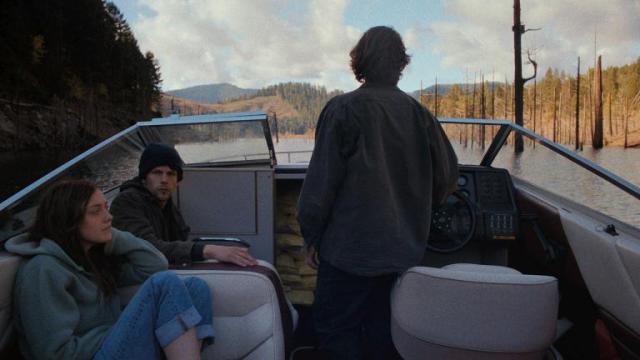
Teenage – 4/10
Director/Writer: Matt Wolf
Starring: Jena Malone, Ben Whishaw
Any release date: TBC
Strand: Documentary
The teenager was an American post-war invention. Apparently. Wolf’s ambitious documentary fuses archive footage with pushy voiceovers (real diaries are rendered with inauthentic tampering), while Bradford Cox’s music plays in the background. Too many ideas are thrown around, suggesting Wolf either isn’t sure himself or is unable to express his thoughts clearly. Further distractions come from modern recreations of the past which are more irritating than insightful.

We Are the Best! – 9.5/10
Original title: Vi Är Bäst
Director: Lukas Moodysson
Writers: Lukas Moodysson, Coco Moodyson (novel)
Starring: Mira Barkhammar, Mira Grosin, Liv LeMoyne
UK/US release date: TBC
Strand: Sonic
“You are not the best. You are the worst.”
Punk leaned on its final legs by 1982; if not dead, a sneering tombstone was on standby. We Are the Best! offers a counterargument with two 13-year-old Stockholm girls who adore punk cassette compilations and start a band in the spirit of teenage rebellion. There’s also, the classic punk accolade: neither can play an instrument.
The two young leads already possess impressive comedic timing, thrusting one-liners that are believable and hilarious. Bobo (Mira Barkhammar) is tomboyish and sternly anti-makeup, as part of her punk ethos. Her best friend Klara (Mira Grosin) shares a rebellious streak, sporting a mohawk and tendency to dominate conversations. In an early scene, the they are dismissed from a school basketball lesson for inadvertently applying communist values to the game (by ignoring team groupings), quickly establishing the loquacious duo as content outsiders – hence the punk group (and a song about the fascist PE teachers).
Bobo and Klara take up drums and bass, with the latter shouting lyrics like: “Abort the sport!” The group find their Mick Jones through Hedvig (Liv LeMoyne), a friendless, normal-looking girl adept at classical guitar. The gang of misfits bring to mind Sam Weir and his pals in Freaks and Geeks, where friendship is the antidote for boredom and being misunderstood by parents.
Lukas Moodysson applies a loving, nostalgic tone to We Are the Best! that emanates warmth and almost no cynicism; despite the clashes between school cliques and differing ideologies, everyone is in on the joke. The period details are effortless, and Stockholm snow adds to the teenagers’ future memories. For Klara, punk’s relevance is more than disliking school and “commercial disco”, but a wider rejection of religion. Klara, with Bobo, attempt to alleviate Hedvig of her Christian background by playing her a song called “Hang God” and cutting off half her hair. Hedvig somewhat obliges, out of friendship, distilling the subculture’s hypocrisy – made even more evident when they meet another band dressed in similar attire.
I’m actually not a fan of Moodysson’s most celebrated feature, Together. However, I laughed throughout We Are the Best! and was transfixed by its earnest positivity. The children strive for an identity, Whether punk or Christianity, eventually finding comfort as their own subculture of three – the “we” of the film’s urgent title. They display anger when anyone suggests they are just “a girl band” – no, they are punk and, indeed, the best.

Follow @halfacanyon for more.







































































